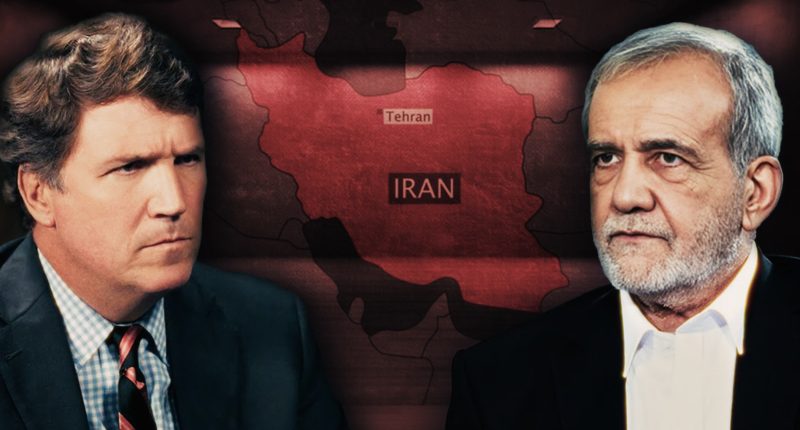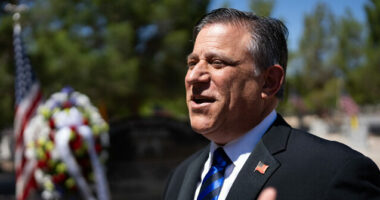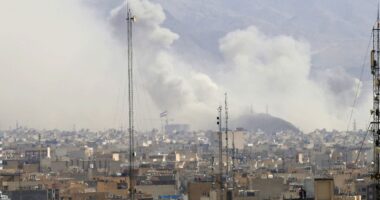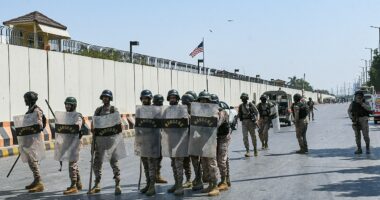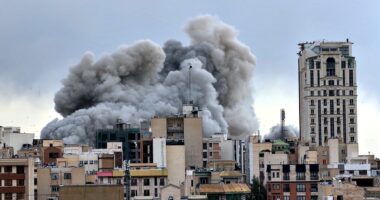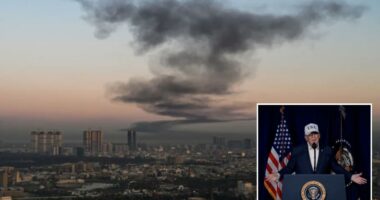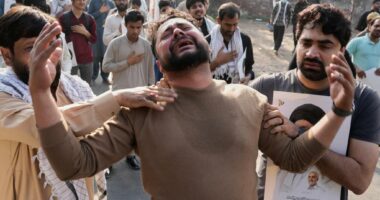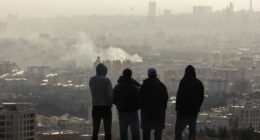Share this @internewscast.com
Tucker Carlson’s interview with Iranian President Masoud Pezeshkian has ignited a fierce backlash within conservative media.
Critics like Mark Levin decry the sit-down as a betrayal, accusing Carlson of legitimizing a regime hostile to U.S. interests. Yet, this bold exchange, aired amidst a pause in U.S.-Iran tensions, challenges GOP hawkish orthodoxy.
Pezeshkian’s calls for peace and denials of nuclear ambitions clash with prevailing narratives, inciting debate. Supporters claim Carlson brings underreported views to light, while critics argue it weakens resolve. This tension underscores a widening gap in conservatism between interventionists and proponents of dialogue, prompting a demand for transparency from Americans on foreign policy.
Masoud Pezeshkian, president of Iran.
(0:00) How Would Iranian President Pezeshkian Like to See This Conflict End?
(0:44) Is Iran Willing to Give Up Their Nuclear Program in Exchange for Peace?
(5:19) Was the International Atomic Energy Agency Spying on Iran and Giving… pic.twitter.com/lMPoFa5ChX
— Tucker Carlson (@TuckerCarlson) July 7, 2025
Interview Breakdown
1. How Would Iranian President Pezeshkian Like to See This Conflict End?
Pezeshkian emphasized Iran’s peaceful intentions, noting his administration did not start the conflict with the U.S. He advocated for national unity and international friendships. This positions Iran as a proponent of peace, starkly contrasting with U.S. allegations of hostility. Historically, Iran has refrained from initiating offensive wars, a point Pezeshkian uses to support his claims.
2. Is Iran Willing to Give Up Their Nuclear Program in Exchange for Peace?
In response to Trump’s assertion that U.S. strikes targeted Iran’s facilities due to its nuclear pursuits, Pezeshkian denied seeking nuclear arms. He referenced a Supreme Leader fatwa against such development, along with past IAEA cooperation. Although recent attacks have complicated verification, Pezeshkian remains open to discussions if verification access is reinstated, indicating a conditional readiness.
3. Was the International Atomic Energy Agency Spying on Iran and Giving Information to Israel?
Pezeshkian voiced distrust in the IAEA, alleging Israel exploited its inspections for intelligence. Iran allowed full access until recent reports, which he claims justified Israeli attacks, eroding trust.
Furthermore, he criticized the IAEA’s silence on these assaults, fueling public skepticism and straining international oversight.
4. Is Iran Open to Diplomacy?
Pezeshkian affirmed willingness to resolve U.S. conflicts through dialogue, based on international law.
He blamed Netanyahu for derailing prior talks, insisting Iran seeks peace. However, he requires assurance against future Israeli interference, demonstrating conditional openness.
This reflects Iran’s strategic approach to diplomacy amidst regional tensions.
5. Has the Israeli Government Tried to Assassinate the Iranian President?
Pezeshkian confirmed an Israeli assassination attempt during a meeting, attributing survival to divine will. He embraced martyrdom for Iran’s sovereignty, noting it united Iranians against Israel.
Moreover, this claim strengthens Iran’s victimhood narrative, citing the killing of off-duty commanders and scientists as evidence of Israel’s aggression.
6. Should Americans Be Afraid of Iran?
Pezeshkian dismissed fears of Iran as a nuclear threat, noting no invasions in 200 years. He clarified “death to America” targets policies, not people, and denied Iranian terrorism against the U.S.
For example, he blamed Israel for a false image, urging Americans to view Iran as peaceful, challenging mainstream perceptions.
7. The Ayatollah’s Religious Decree Against Donald Trump
Pezeshkian denied ayatollah fatwas against Trump, stating they condemned religious insults, not individuals. He distanced this from government policy, assuring no personal threat. Furthermore, he suggested misinterpretations by others, emphasizing a nuanced religious stance.
8. Has Iran Ever Tried to Assassinate Trump?
Pezeshkian refuted assassination attempt claims on Trump, blaming Netanyahu’s agenda. He emphasized Iran’s focus on self-defense, urging the U.S. to avoid manipulation into war. Consequently, this rejection counters U.S. narratives, reinforcing Iran’s defensive posture.
9. Are There Iranian Sleeper Cells in the United States?
Pezeshkian rejected sleeper cell allegations as Israeli propaganda, praising expatriates’ civility. He denied government-directed violence, framing fears as efforts to involve the U.S. in regional conflict. Thus, this stance seeks to dispel security concerns among Americans.
10. What Happened to the Relationship Between Iran and Israel?
Pezeshkian blamed Israel’s actions in Palestine, including genocide and blockades, for the rift. He denied past weapon purchases, insisting Iran never sought war. Moreover, he portrayed Israel’s attacks as the sole cause, highlighting a history of peaceful intent.
11. Sanctions and American Business in Iran
Pezeshkian welcomed U.S. investment, citing the Supreme Leader’s support, but noted sanctions as the barrier. He urged Trump to choose peace over Netanyahu’s war agenda, suggesting economic ties could grow. For instance, he emphasized Iran’s openness to trade if restrictions lift.
12. If War Breaks Out With Iran, Would They Receive Assistance From Russia and China?
Pezeshkian relied on divine trust and Iran’s self-sufficiency for defense, rejecting reliance on Russia or China. He warned against U.S. involvement in Netanyahu’s wars, advocating peace. Thus, this self-reliant stance underscores Iran’s resolve to avoid escalation.
Conclusion
Pezeshkian’s interview with Carlson provides a provocative lens on Iran’s stance, challenging conservative media’s warlike posture.
His peace advocacy and nuclear denials contrast with U.S. narratives, while his critique of Israel highlights its role in instigating the conflict.
Carlson’s divisive move exposes a fault line between hawks and those seeking neutrality.
For Americans, this dialogue demands scrutiny of foreign policy, urging leaders to reject war and demand accountability.
